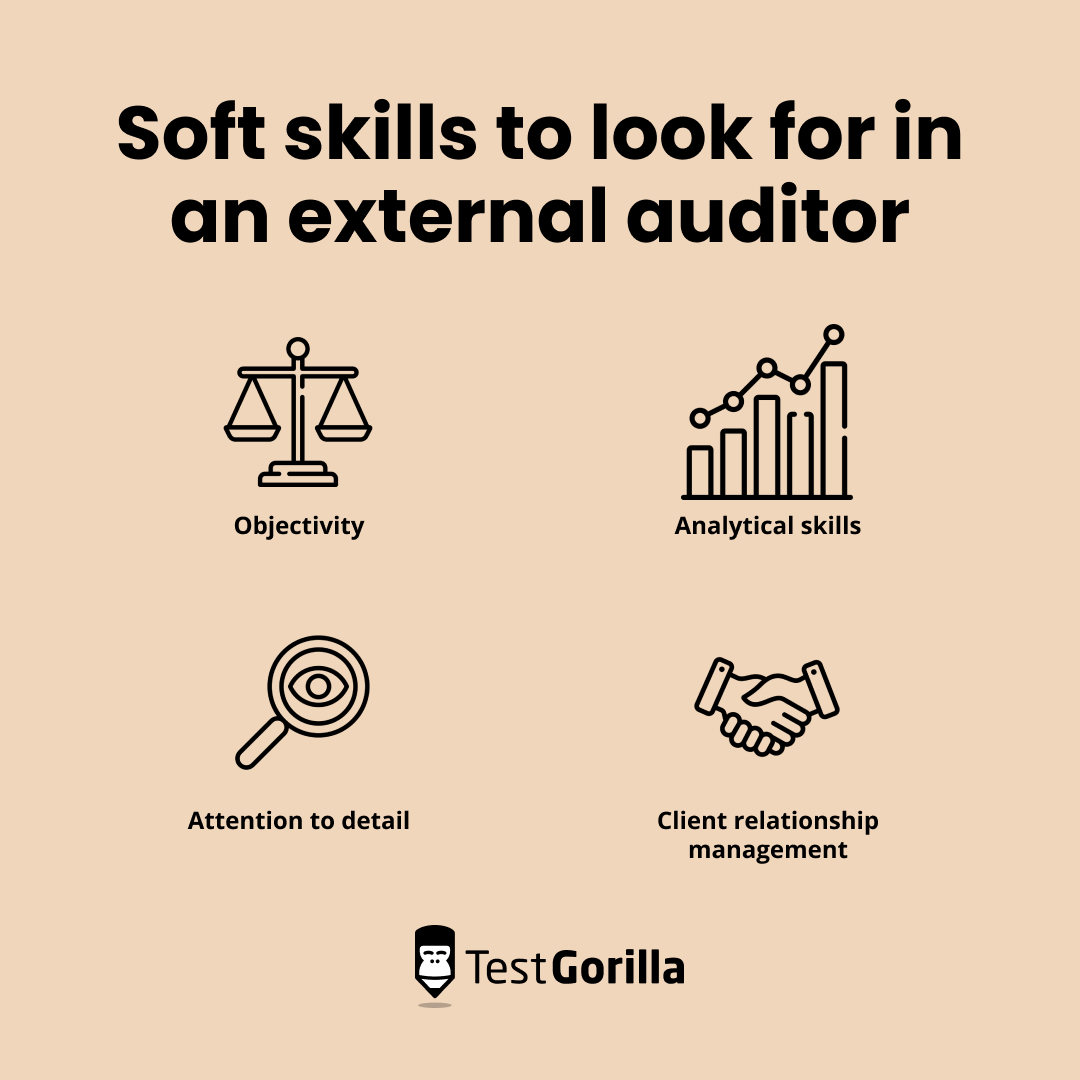External auditors offer unbiased audits to help ensure your compliance with financial regulations. They don’t only help you spot typos and budgeting errors. By assuring external stakeholders of your financial statements’ accuracy, they also earn you more credibility.
Stakeholders might not trust the accuracy of financial statements audited by a questionable external auditor. Unreliable external auditors might miss errors or intentionally misrepresent information, which could result in compliance issues. And bad audits will likely need to be redone – costing you time and money.
In this guide, we explain what you must know before you hire an external auditor to ensure you hire one who’s reliable. Our guide includes key skills to look for, where to find suitable candidates, how talent assessments work for finding external auditors, and common mistakes to avoid.
Table of contents
- The difference between internal and external auditors
- What you need to know before hiring an external auditor
- Skills and qualifications to look for in an external auditor
- Where to find skilled external auditors
- How to select the best external auditor candidates
- Common mistakes when hiring an external auditor
- Find the right external auditor with TestGorilla
The difference between internal and external auditors
External auditors differ from internal auditors.
Internal auditors are usually employees. They report to a manager in the organization and assess and enhance internal controls. Their primary goals are to make their companies more profitable and efficient.
External auditors, on the other hand, remain external to your organization while they audit your business. They’re usually hired through an auditing or accounting firm.
External auditors’ primary focus is verifying the accuracy and reliability of financial statements to ensure those statements comply with accounting standards. They report directly to stakeholders – including shareholders or regulatory bodies – rather than being part of the internal management structure at your company. Their external status enables them to give an independent opinion on your organization's financial health.
What you need to know before hiring an external auditor
Here are a few things to consider before hiring an external auditor.
Audit scope and complexity
Consider the scope and complexity of your financial operations before you pick an auditor. For example, if your business operates across multiple states, you might want to use an auditing firm with a larger presence to ensure they have the necessary resources and expertise to handle multi-state regulatory requirements while appeasing your investors. If your business trades in a heavily regulated and complex industry like pharmaceuticals, you’ll likely want an auditor with expertise in your industry, including its specific risks and regulations.
Stakeholder interests
Consider the expectations and interests of your stakeholders, whether they’re shareholders, regulatory bodies, or customers who rely on the integrity of your financial reporting. For instance, stakeholders might prioritize auditors from firms with a strong reputation for ethical practices or those known for their thoroughness and accuracy in specific industries.
Professional certifications
Be prepared to consider your candidate’s educational background before making a hire. Firms vet their auditors and check their qualifications. However, you can still independently verify the educational background of your potential auditor, especially if you work in a niche or highly regulated industry.
External auditors usually need professional and academic qualifications to fulfill their role. These include:
A bachelor’s degree. External auditors usually hold a bachelor’s degree in finance, accounting, or business. A degree in accounting is preferred since it gives a specialized foundation in accounting principles, financial reporting, and auditing practices. However, alternative degrees can also be beneficial, especially when accompanied by other professional qualifications.
A master's degree. A master's degree in business, finance, mathematics, or accounting is beneficial for external auditors. If your candidate holds a bachelor’s degree in a discipline other than finance, business, or accounting, they may need a master's in one of these disciplines.
Other professional certifications. External auditors benefit from having a Certified Public Accountant (CPA) certificate and holding Chartered Accountant (CA) status, Certified Fraud Examiner (CFE) status, or Certified Internal Auditor (CIA) status. These aren’t legal requirements. However, they demonstrate an auditor’s expertise in accounting, auditing, and risk management, which enhance the credibility of external auditors.
Fees
Expect to pay a predetermined fee for an auditor’s services. This might be an hourly rate or a fixed fee. Either way, you probably won’t be able to negotiate this price, so ensure you’re comfortable paying it. More-experienced auditors will come at a higher price point, while those new to the industry may be more reasonably priced.
Fees might also vary based on the scope and complexity of the audit.
Unusually low prices are a red flag, indicating a lack of experience, quality, or thoroughness in the audit process.
Skills and qualifications to look for in an external auditor
Auditing is highly technical, but don’t underestimate the importance of soft skills in your candidates. Look out for a candidate with a mix of the following abilities.
Hard skills
Understanding of financial statements. Candidates need a robust understanding of financial statements to assess a company’s financial health effectively. A good external auditor should have a solid understanding of accounting principles and quickly recognize any discrepancies or irregularities.
Double-entry accounting. Understanding double-entry accounting is key in auditing roles. A strong grasp of how debits and credits impact financial statements is crucial for conducting precise and thorough audits.
Legal compliance requirements. External auditors need knowledge of current accounting standards, regulations, and industry-specific legal frameworks. They also must know how to ensure financial statements’ adherence to state and federal laws.
Knowledge of computer systems. External auditors need excellent understanding of computer systems. They must grasp new systems quickly and adapt to different software.
Knowledge of accounting software. Candidates need knowledge of different accounting software. Familiarity with popular software packages will enhance efficiency when analyzing financial data for a streamlined audit.
Proficiency with auditing tools. External auditors often know how to use auditing tools to enhance their auditing. These might include data analytics software, continuous auditing and monitoring tools, and computer-assisted audit techniques (CAATs).
Soft skills
Objectivity. Objectivity is key for external auditors. They must approach their work without bias to ensure all assessments are as fair and measured as possible.
Analytical skills. External auditors must be able to analyze complex financial data. Analytical skills enable auditors to identify patterns, trends, and anomalies in financial statements.
Attention to detail. External auditors need a keen eye for detail to catch small errors and discrepancies in bookkeeping.
Client relationship management. Audits can be a tense time. External auditors should be able to maintain professional relationships with clients while navigating challenges that arise during the audit process.
Where to find skilled external auditors
The best way to find auditors is through firms offering auditing services.
Professional auditing firms
Professional accounting auditing firms have various skilled professionals to pick from. These professionals have different areas of expertise and industry experience, meaning you can often hire an external auditor with specific experience in your niche.
Professional auditing firms aren’t always called professional auditing firms. Sometimes they’re financial consulting firms, accounting firms, or certified public accountant (CPA) firms. They might also market their services as financial advisory services or audit and assurance services. Auditors are employed by these organizations and contracted out to other businesses.
Local firms
Local firms might be preferable, especially if you want in-person interaction with your auditor. To find firms in your area, try Googling “audit services in [your area].”
Remote auditing
Nowadays, auditors can access financial data, conduct interviews, and perform many audit functions online. Many auditing firms offer remote auditing services. Consider choosing remote services if the expertise required for your industry or the specific nature of the audit isn’t available locally. However, please note that remote auditing isn’t suitable for all situations.
3 creative ways to find external auditor candidates
Sometimes, you might need to get a bit more creative to find worthy candidates.
1. Industry conferences
Industry conferences are a great place to find independent external auditors. These events gather a range of auditing professionals passionate about staying current with industry trends. Try attending some networking events at these industry conferences to forge connections and hire external auditors.
2. Hackathons
Hackathons often have an auditing section that can help you find upcoming auditing talent. New auditors can highlight their technical skills, show their attention to detail, and demonstrate their ability to navigate complex auditing challenges.
3. Industry-specific workshops
Industry-specific workshops will help you find auditors who specialize in your industry. This means they’ll have the expertise to navigate the specific challenges and regulations within your sector. Although finding auditors in these workshops may be tricky, the effort is well worth it for the targeted expertise they bring.
How to select the best external auditor candidates
External auditors need a robust mix of hard and soft skills to provide excellent service. The most efficient and objective way to measure these skills is with skills testing.
TestGorilla’s talent assessment platform is a great way to assess an auditor’s skills and capabilities, and we have various tests for auditors. Combine two to five tests to create a comprehensive assessment, and customize it with your own test questions.
Try using the following tests to create your custom assessment:
International standards on auditing tests: This test assesses a candidate’s proficiency in conducting audits and adhering to established international standards.
Attention to detail (Visual) test: This test measures whether candidates can notice small changes in patterns, number sequences, or images.
Advanced accounting test: This test assesses a candidate’s bookkeeping and accounting skills, including knowledge of basic terminology, ability to calculate figures and balance sheets, and management of financial records.
Critical thinking: This test assesses how well candidates recognise patterns, use assumptive reasoning, and deduce cause and effect.
Communication skills test: Communication skills tests help you measure a candidate’s professional etiquette and written communication style.
Business ethics: This test measures a candidate’s awareness, judgment, and ability to spot conflicts of interest.
After you’ve narrowed down your top picks, ask them about their experience in industries like yours and the challenges they've faced and solved. Request examples or case studies that show how they've navigated auditing in the past. Attempt to ensure they have the expertise needed for your business.
Also assess the potential for a strong working relationship. Engage in open conversations about their communication style, availability, and their handling of client concerns or disagreements. This will give you insight into their professionalism.
Common mistakes when hiring an external auditor
Avoid these two common mistakes that organizations make when hiring external auditors.
Rushing the selection process
An audit date that creeps up on you may tempt you to hire the first available auditor to get the job done. Don’t do this.
You must allow sufficient time for researching, assessing, and feeling out potential auditors before you make a contracting decision. Although this can be frustrating, it can save you the pain and expense of hiring an ill-suited or unreliable auditor and will ultimately lead to a better audit.
Not looking into reputation and past performance
An auditor’s or auditing firm’s track record is a good indicator of their ability to audit your company thoroughly and ethically. So neglecting reviews, references, and other elements of their record can lead you to hire an auditor you can’t rely on.
Red flags to watch out for include negative client feedback and a history of ethical or legal issues. An auditor who’s been penalized by a regulatory body probably isn’t the best auditor to use, for example.
Find the right external auditor with TestGorilla
External auditors offer a critical layer of accountability beyond what your internal team can offer. They comb through your financial records with meticulous attention to detail – ensuring accuracy, impartiality, and adherence to regulatory standards.
As a result, you must ensure they have the right mix of hard and soft skills. This includes attention to detail and accounting skills, along with knowledge of auditing standards. You can measure these using TestGorilla’s fully customizable talent assessments.
Curious about the platform? Sign up for a free product tour today. Alternatively, sign up for a free account to discover the benefits of a skills-based hiring approach.
Related posts
Hire the best candidates with TestGorilla
Create pre-employment assessments in minutes to screen candidates, save time, and hire the best talent.
Latest posts
The best advice in pre-employment testing, in your inbox.
No spam. Unsubscribe at any time.

Hire the best. No bias. No stress.
Our screening tests identify the best candidates and make your hiring decisions faster, easier, and bias-free.
Free resources
This checklist covers key features you should look for when choosing a skills testing platform
This resource will help you develop an onboarding checklist for new hires.
How to assess your candidates' attention to detail.
Learn how to get human resources certified through HRCI or SHRM.
Learn how you can improve the level of talent at your company.
Learn how CapitalT reduced hiring bias with online skills assessments.
Learn how to make the resume process more efficient and more effective.
Improve your hiring strategy with these 7 critical recruitment metrics.
Learn how Sukhi decreased time spent reviewing resumes by 83%!
Hire more efficiently with these hacks that 99% of recruiters aren't using.
Make a business case for diversity and inclusion initiatives with this data.


















